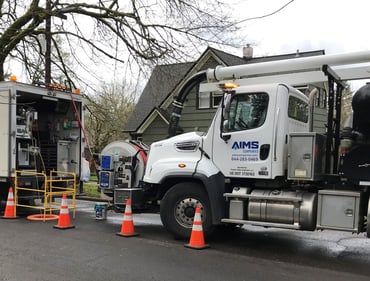It’s impossible to ignore the impact that AI is having on utility management and the wastewater industry. Municipalities and contractors that have gotten their hands on the technology are already seeing returns, and while adoption may be gradual, forward-thinking decision-makers are educating themselves and their teams about where AI could fit into operation and maintenance workflows.
Emphasize the Role of AI in the Industry
The wastewater industry is always looking for new ways to streamline operations to make crews more productive and cost-efficient. Over the past decade, AI has stepped into the spotlight in a big way, with true AI inspection tools hitting the market in recent years. It’s here, and it’s already proving helpful in real-world case studies.
At AIMS Companies, Regional Vice President Kent Ford outlined how AI defect coding services have helped this contractor fine-tune operations in a way that customers have recognized. “You see AI popping up everywhere,” he said. “I think it’s going to have its place in this industry, and right now, we’re figuring out how that’s going to play out.”
Acknowledging with your team the existence, present use and increasing adoption of AI sets the precedent that not only will crews encounter industry-relevant AI solutions, but they'll benefit from a head start in learning how those solutions best fit into existing workflows.
Discuss How You'll Be Working With AI Technology
Using AI means harnessing AI as a tool for your team’s benefit. It’s easy to feel threatened by an emerging technology that claims to do parts of your job as efficiently as you do. That’s why it’s important to emphasize that teams at every level will need to learn the nuances of working with AI, not for or against it.
Whether initiating video scans, relying on the output of 3D models or streamlining workflows around automated solutions, utilities are starting to engage with AI in the same way they did previously with cloud-based software and digital reporting methods. These days, managers have the opportunity to sit down to discuss the actual workflow changes that crew members may experience with the implementation of AI. Try this with your team and ask them one key question: How can we make AI work for us?
Highlight the Long-Term Benefits
Ultimately, AI exists to make inspection jobs easier, leaving crew members with more mental and physical bandwidth to handle nuanced and hands-on tasks. This cuts costs and shortens project completion times, and it also has the potential to raise morale among crew members who may have previously been pressed to their limits. And these individual benefits become workflow benefits as management begins to tailor everyday expectations toward AI usage. In turn, this ripples out to customers in the form of faster response times, more accurate deliverables and a more efficient utility company.
WinCan’s AI has already begun to reshape the way water utilities and contractors handle inspection data and when paired with a cloud-based inspection management solution, teams can begin to familiarize themselves with AI technology at every level. Get in touch with our team to schedule a demo:





